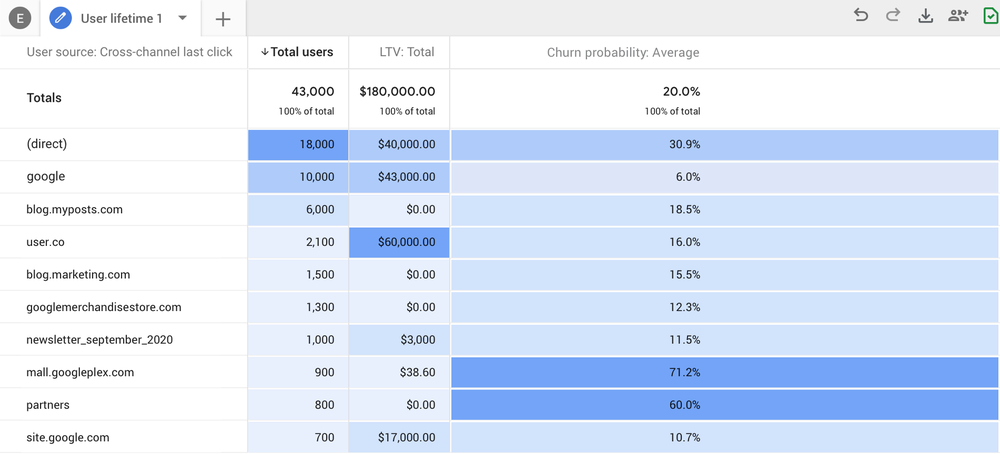There is already a date for Google to definitively retire the properties of the Universal Analytics type, or the Google Analytics “of all life”, with which almost all marketers in the world are used to working.
Its successor, in case we want to continue working with a Google solution and also for free, is Google Analytics 4, which has some fundamental differences from UA in how it measures web traffic.
To make it clear as soon as possible: it is not possible to maintain data continuity between one generation and another of Google Analytics, since they do not measure web traffic in the same way. This represents a problem that not many realize.
If we have not yet switched to GA4 or another measurement system, sometime between now and July 2023 we will have to experience a “small” cut or bump in the format and criteria for collecting our traffic data.
What is Google Analytics 4?
Google Analytics 4 is a new evolution of Google Analytics that is no longer focused on measuring what is happening on a web page, but instead offers relevant metrics for other digital properties, such as mobile applications.

New predictive metrics Source Google.
Google Analytics 4 It represents a more comprehensive and complete way of knowing what is happening with our website and a new way of raising issues such as conversion attribution.
Being such a radical change, differences and novelties Regarding the Analytics that we knew (also called Universal Analytics) there are many. These are the most important:
- In Universal Analytics, the basic metrics were pageviews and sessions (a set of pageviews in a maximum 30-minute period). Instead, now the Google Analytics 4 unit of measurement is events, which allow interactions that do not occur through web pages to be more effectively measured.
- Google Analytics 4 uses machine learning to offer more intelligent analysis, for example, through predictive metrics, which tell us how likely a user is to convert or that he leaves us. It also allows you to analyze the behavior of individual anonymized users.
- New improved ways to medit interactions and engagement. Where before we had the bounce rate, now we can expand the information with metrics such as scrolls, clicks or file downloads.
- Improved event editing. Because events are now the focus of measurement, Google Analytics 4 makes it much easier to edit and fix events without adjusting the implementation code.
- Google Analytics 4 focuses on the privacy of users and data protection, since in recent years this has become a sensitive issue and much more regulated through laws like the GDPR. Since Chrome aims to abandon third-party cookies by 2022, the new system has ways to analyze data that don’t require cookies.
- New reports. The reports have been simplified and reorganized to be more intuitive. For example, reports have been added around the user lifecycle, from acquisition to conversion to retention. For example, we can look at the acquisition report to see which channels are bringing in new customers, and then find out what actions those customers take with the retention report.
- Google Analytics 4 incorporates multi-domain measurement, which allows us to unify the different domains of a brand in a single flow. Thus, we can have a much more complete picture of the user journey.
- Better customer journey tracking across different sessions and across both apps and websites, allowing us to more accurately attribute conversions.
- More free premium features, such as integration with BigQuery.

Until when can we use Universal Analytics properties? What will happen to the history?
The day chosen to definitively close the functionality of Universal Analytics is July 1, 2023. Starting on that day, Universal Analytics properties will no longer record hits.
Until July 1, 2023 they will continue to work as they always have, so you can continue to rely on Universal Analytics or GA3 to measure your web traffic, but it is a good idea to move to a alternative solution in order to have a history as soon as possible in the new tool you use (such as explained here).
Universal Analytics will continue to store the history of each account for at least 6 more months, and beyond that time, it will be the responsibility of each client to have duly extracted that data, in order to keep them.
¿Por What has Google decided to do away with Universal Analytics?
For Google, the Universal Analytics properties had become obsolete in their approach. Universal Analytics was designed in a world where traffic was primarily desktop and happened within websites (not apps). In addition, it was made to measure independent sessions (instead of journeys or processes that can end up with a conversion or sale) and totally depended on cookies to be able to do this measurement.
Given this, Google started developing a separate product two years ago (GA4) that was almost the opposite of UA in its approach: it is cross-platform (it can measure web and app traffic), it is based on user events rather than on the session concept, and lastly, it doesn’t rely solely on cookies,
Beyond the reasons that have to do with cookies and user privacy, Google does detail a little more in its announcement the other two reasons that have motivated the cookie:
- Google Analytics 4 is a better prepared product to measure the journey of a useracross several platforms. In other words, if you have a website and an app, before GA4 it was impossible to establish which users visited you through both the website and the app, and now we can do it.
- GA4 incorporates advances in machine learning that allow you to make predictions about your traffic and draw conclusions or insights about where there has been an unexpected spike or a change in behavior by your users . We might wonder why they haven’t brought that predictive and analytical capability to UA properties, but I’m afraid we’ll never have an answer.

When should we start measuring our web traffic with GA4 or another tool other than Universal Analytics?
The need to already activate a GA4 property (or any other alternative) becomes even stronger. If in July 2023 we are going to run out of Universal Analytics data, and if we have not been quick to configure a new tool, we will see that we have very little history to compare with previous periods.
For example, let’s say a particular company delays moving to GA4 or its next analytics tool until June 2023. This means that until July 2024, you won’t be able to compare the last month with the same month last year. (comparison YoY).
Conversely, if we haven’t done it yet, but do so before the end of March, we’ll be able to have full YoY data in the new system as early as May 2023 (before Universal Analytics shuts down for good). In other words, there will never be a month where we can’t compare ourselves to the previous year’s data, whether using UA or the new measurement tool.
Is GA4 as bad as they say?
If you go around Twitter and other forums, you will see many comments against this change and against GA4 in particular, since it is perceived as a tool still half done, and in general different from UA. Nobody likes changes, especially when they are imposed, so this resistance is normal.
On the other hand, I suspect that many of these negative comments are not about what GA4 is like now, but what it was like when it was officially released in October 2020 (before that they existed only as beta, under the name Web+app). I admit that my first impressions were that the tool was green, at least compared to a product as mature as GA3, but since then it has been improving in specific aspects.
Logic tells me that if Google has given itself 15 months to completely shut down UA, it will use this time to introduce even more improvements. There will never be a GA4 identical in all its functionality to the Universal Analytics properties, but at least it can reach the level of usability, flexibility and documentation that UA has, and I think it will. We will see.
Finally, there is the issue of the platform (or ecosystem) and the community. If you use Google Ads for your paid campaigns, there’s no doubt that GA4 support (audiences, campaign tagging, conversions) will weigh heavily in your decision to stick with Google for analytics.



